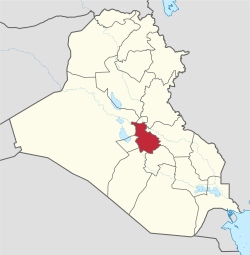| November 2016 Hillah suicide truck bombing | |
|---|---|
| Part of the War in Iraq (2013–2017) and the Persecution of Shias by the Islamic State | |
 Location of Babil Governorate in Iraq | |
| Location | Hillah, Babil Governorate, Iraq |
| Date | 24 November 2016 |
| Target | Petrol station |
Attack type | Suicide truck bombing |
| Weapons | Truck bombs |
| Deaths | 125 (+1) [1] |
| Injured | 95+ [1] |
| Perpetrator | |
A suicide bombing occurred in Iraq on 24 November 2016 [2] when a truck bomb exploded at a petrol station in Hillah, some 100 kilometers (62 miles) from southern Baghdad, killing at least 125 people and injuring many others.
Contents
Shia pilgrims were en route back to Iran after the 2016 Arba'een Pilgrimage. [3] [4] [5] Besides Iranians, people from Basra and Nasiriyah were also killed in the attack. [6] [7]
The Islamic State claimed responsibility for it.